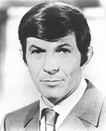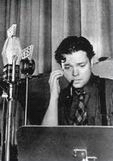
 Double Star by Robert A. Heinlein; Read by Lloyd James
Double Star by Robert A. Heinlein; Read by Lloyd James
5 Cassettes – 7.5 hours [UNABRIDGED]
Blackstone Audiobooks
Date Published: 1999
List Price: USD $39.95 – IN PRINT
ISBN: 0786117451
Themes: Science Fiction / Sci-Fi / Fantasy / Mystery / Pulp / Politics / Mars / Spaceships / Acting / Theatre / Shakespeare
One minute, down and out actor Lorenzo Smythe was – as usual – in a bar, drinking away his troubles as he watched his career go down the tubes. Then a space pilot bought him a drink, and the next thing Smythe knew, he was shanghaied to Mars. Suddenly he found himself agreeing to the most difficult role of his career: impersonating an important politician who had been kidnapped. Peace with the Martians was at stake – failure to pull off the act could result in interplanetary war. And Smythe’s own life was on the line – for if he wasn’t assassinated, there was always the possibility that he might be trapped in his new role forever!
Some Heinlein readers believe that the philosophy in Starship Troopers was Heinlein’s personal philosophy. They’re wrong. Heinlein’s primary philosophy was to provoke thought by explicating political consequences of certain philosophies… and to be entertaining doing it. Double Star proves this emphatically, presenting a completely different political system than Starship Troopers. The plot is a well known one. As old as the fairy tale The Prince and The Pauper, The Prisoner of Zenda or The Man In The Iron Mask; As new as the Hollywood movie Dave (1994) starring Kevin Kline.
This unabridged audiobook has so much more: Interplanetary space travel, alien contact and political upheaval. But it also has a fully realized political system, political campaigns, theory of government, theory of acting, kidnapping, murder, dirty tricks and its a mystery! There really is no better science fiction writer than Robert A. Heinlein. There are other great books by other great writers but none is as great as the dean of science fiction RAH. The reason? Simply put, he tells damn fine stories and does so constantly. This novel is a great example of just that. With a wild premise and a somewhat divergent plot (from Heinlein’s various themes) it tells an implausible story plausibly with emotional impact. This book won a Hugo award for 1956 (Heinlein’s first) and deserved it. It’s a fun ride and highly enjoyable. Pop it in your cassette deck and enter a different world.
Search for this title on eBay
posted by Jesse Willis

 Green Hills of Earth/Gentlemen Be Seated by Robert A. Heinlein, read by Leonard Nimoy, Caedmon, 1977
Green Hills of Earth/Gentlemen Be Seated by Robert A. Heinlein, read by Leonard Nimoy, Caedmon, 1977 I type that from memory, hearing Leonard Nimoy’s voice in my mind’s ear. These two stories make my favorites list probably for nostalgic reasons, though Leonard Nimoy is an excellent narrator. This was one of the first audiobooks I listened to as a youth – it was one of the tapes in my local library’s small collection. I found it one day while looking through the few old time radio cassettes. This was also my first exposure to Robert A. Heinlein, and I was hooked. I was struck (and still am) by Heinlein’s ability to make his future so normal to all the people in it.
I type that from memory, hearing Leonard Nimoy’s voice in my mind’s ear. These two stories make my favorites list probably for nostalgic reasons, though Leonard Nimoy is an excellent narrator. This was one of the first audiobooks I listened to as a youth – it was one of the tapes in my local library’s small collection. I found it one day while looking through the few old time radio cassettes. This was also my first exposure to Robert A. Heinlein, and I was hooked. I was struck (and still am) by Heinlein’s ability to make his future so normal to all the people in it. 
 In the news… Neil Gaiman continues to collect well-deserved awards. A couple of weeks ago, he accepted the Nebula Award (Best Novel) for his American Gods. He’s on the list of Hugo nominees (Best Novella) for Coraline. The
In the news… Neil Gaiman continues to collect well-deserved awards. A couple of weeks ago, he accepted the Nebula Award (Best Novel) for his American Gods. He’s on the list of Hugo nominees (Best Novella) for Coraline. The 
 In 1999, Del Rey published Vector Prime by R.A. Salvatore. This novel was the first in a projected 22 novels in a series called The New Jedi Order. This week, the
In 1999, Del Rey published Vector Prime by R.A. Salvatore. This novel was the first in a projected 22 novels in a series called The New Jedi Order. This week, the  These books have an overriding story, which readers (and listeners) like me really appreciate. Most media tie-in series are held in a tight grip – stuff is not allowed to happen. Each novel must end exactly where it began, allowing the next author’s tale to make sense. But in the New Jedi Order series, there was an overall plan to the 22 volumes to start with. Each author wrote his or her part of the story arc, and the results are excellent. In short, stuff happens in these books.
These books have an overriding story, which readers (and listeners) like me really appreciate. Most media tie-in series are held in a tight grip – stuff is not allowed to happen. Each novel must end exactly where it began, allowing the next author’s tale to make sense. But in the New Jedi Order series, there was an overall plan to the 22 volumes to start with. Each author wrote his or her part of the story arc, and the results are excellent. In short, stuff happens in these books.
 War of the Worlds, Mercury Theater of the Air, 1938
War of the Worlds, Mercury Theater of the Air, 1938 The quality of the script and the convincing performances of Orson Welles and the actor who, as a newscaster, described the emergence of the Martians from a crater left when they landed in Grover’s Mill, New Jersey, make this one of my all-time favorite audio dramas.
The quality of the script and the convincing performances of Orson Welles and the actor who, as a newscaster, described the emergence of the Martians from a crater left when they landed in Grover’s Mill, New Jersey, make this one of my all-time favorite audio dramas.